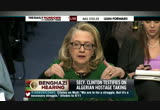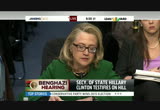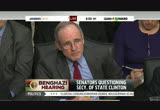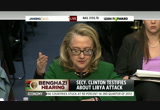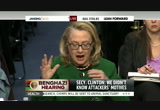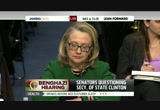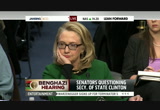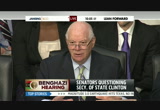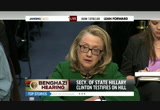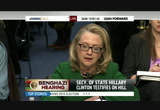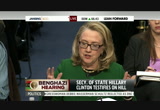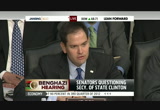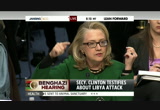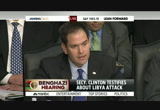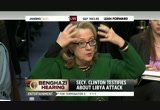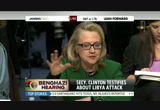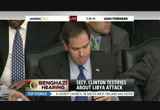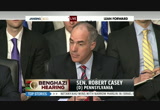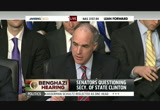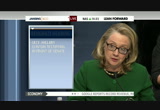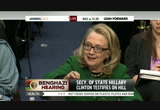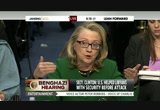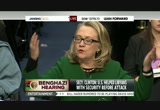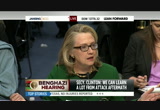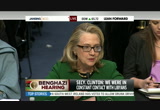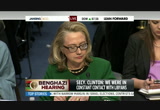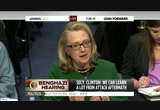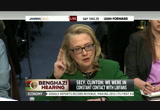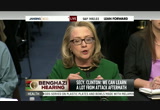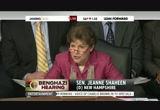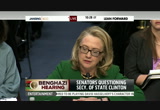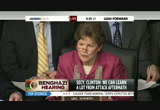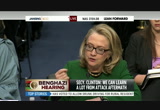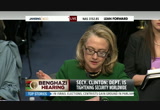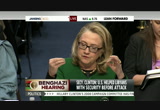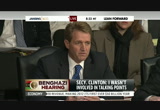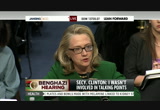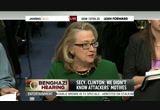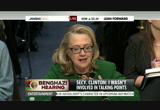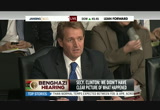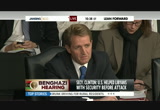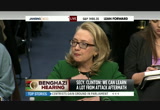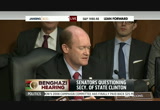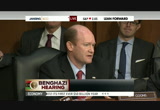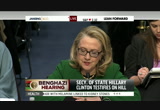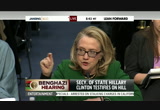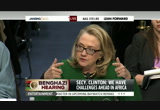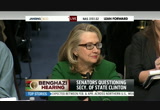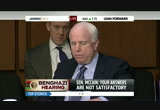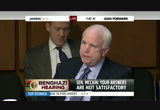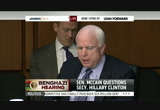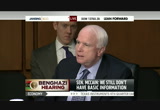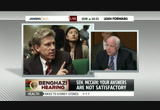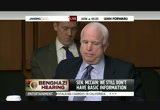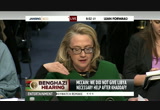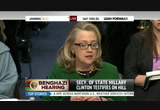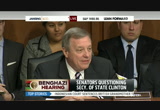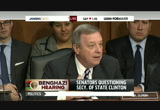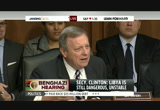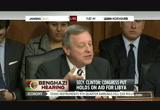tv Jansing and Co. MSNBC January 23, 2013 7:00am-8:00am PST
7:00 am
there was not an ability for evidence ton presented yesterday that was capable of being presented in an open court. but the tunisians have assure d us they are keeping an eye on him. we are checking that all the time. >> you just testified in your prepared remarks that you said, quote, the very next morning, which would have been wednesday morning, i told the american people that quote, heavily armed militants assaulted our compound and vowed to bring them to justice. i'm assuming that you had rock solid evidence to make such a bold statement at that time. >> well, we had four dead people and we had several injured, one seriously who is still in walter reed. although we did not have the chance yet to meet with any of our returnees, our team in tripoli had received them, gotten medical care for them,
7:01 am
and had sent them on. so we knew that clearly there was an attack, a heavily armed attack. who these people were, where they came from and why they did it, that was still to be determined. >> i think you probably know where i'm going with this. the next sentence is -- and i stood with president obama as he spoke of an act of terror. be that as it may, i want to move to the next sunday morning when ambassador rice went to the morning -- sunday morning talk shows. and i think we all realize this happened at a politically charged time here in the country as we approached an election. notwithstanding that, the american people are still entitled to be told the truth about this. did you select ambassador rice to deliver the message to the american people? >> i did not, senator. let me take this opportunity to address this. obviously even though i haven't had a chance to testify, i've
7:02 am
certainly seen the resulting debate and concerns about this. you're right, it was a terrorist attack. i called it an attack by heavily armed militants -- >> well done. >> and that is clearly what happened. we know that. but second, the harder question is what caused it and that we didn't know. we didn't know who the attackers were and what the motives were. third, as the arb makes clear after the months of research, the picture remains still still somewhat complicated and i say that because in the unclassified arb, it is -- i quote, key questions surrounding the identity and actions and motivations of the perpetrators remain to be determined. i recommend that all members and staff read the classified version of the arb, which goes into greater detail. i obviously can't speak to it but it does go into greater detail because there were a
7:03 am
variety of potential causes and triggers for this attack. there's evidence that the attacks were deliberate and precoordinated but not necessarily indicative of extensive planning. fourth, senator, i would say that i personally was not focused on talking points. i was focused on keeping our people safe. as i said, i have a very serious threat environment in yemen. it turned out we had people getting over that wall in cairo doing damage until we got them out. we had a serious threat against our embassy and i had to call the president of tunisia and beg him to send reinforcement. it could have been a disaster, they burned and trashed our school. i was pretty occupied about keeping our people safe, doing what needed to be done in the follow-up to benghazi. i really don't think anybody in
7:04 am
the administration was really focused on that so much as trying to figure out what we should be doing. and you know, i wasn't involved in the talking points process. as i understand it, as i've been told, it was a typical inner agency process where staff including from the state department, all participated to try to come up with whatever was going to be made publicly available and it was an intelligence product and it's my understanding the intelligence community is working with committees to explain the whole process. >> thank you i have follow-up questions but my time is up. i gather you still stand by the statement that heavily armed militants assaulted our compound and you vowed to bring them to justice, you still stand by that? >> absolutely. >> senator cardin. >> first, congratulations and
7:05 am
thank you for your extraordinary service to our country during these past four years as secretary of state. i believe the world is safer today because america is better understood around the world. and you have been instrumental in integrating diplomacy in our national security agenda. i thank you for that because i do think it has paid off in heavy dividends for the american people. i particularly want to acknowledge your leadership in advancing basic rights. senator boxer acknowledged the gender equity issues you have taken an international leadership on. i also want to thank you for your help in dealing with corruption, particularly with transparency in the extractive psychiatries and progress we've made in that regard. benghazi was a tragedy. we've all acknowledged that. the lost of american lives and we also acknowledged the bravery of the people on the ground. they did extraordinary service and saved lives. and that's what they are trained to do and we want to make sure that we acknowledge that.
7:06 am
also, let me point out that you have been very open with the committee. we had a hearing on december 20th with your deputies and they provided all of the information and you're here today. we thank you very much for that. i want to follow up on one area of northern africa that you point out the risk factors that we currently have in northern africa. algeria is a reminder of the global security concerns. we do not know as senator rich pointed out the individuals who may have been involved in libya may have been involved and algeria, we don't know that. we do know there's reports from the united nations and others that weapons have gotten from libya into algeria, which points out our need as we look at transitions occurring in that region, syria, assad is not going to be there we think much longer. there's a lot of weapons in syria. do we have a strategy to make sure as we go through transition
7:07 am
in countries that their weapons are -- we're mindful that these weapons could end up harming u.s. interests and it needs to be part of the strategy that make sure as we support alternative governments and the rebels that there is a strong priority in protecting the source of these weapons not ending up harming americans or harming our interests. >> well, senator, you're absolutely right. one of the reasons that we and other government agencies is exactly that, we have a concerted effort to try to track down and find and recover as many man pads and other dangerous weapons as possible. libya was a wash in weapons before the revolution. obviously there were additional weapons introduced. but the vast, vast majority came
7:08 am
out of gadhafi warehouses and as they were saying, liberated and then went on the black market. were seized by militias and seized by other groups and have made their way out of libya into other countries in the region. and have their made way to syria, we believe. it is a red line for this administration with respect to syria concerning the use of chemical weapons. syria as you probably know in addition to having the fourth largest army before this revolution, has a very significant supply of chemical and biological weapons. given the instability in syria right now, what we are trying to do is to coordinate closely with
7:09 am
the number of like minded nations, neighbors and partners to be able to work to try to prevent those from falling into the wrong hands, jihadist hands, hezbollah hands, but also to try to work with the internal opposition for them to understand the dangers that are posed. so this pan dora's box, if you will, of weapons coming out of these countries in the middle east and north africa is the source of one of our biggest threats. there's no doubt that the algerian terrorists had weapons from libya. there's no doubt that the malian remnants of aqim have weapons from libya. we have to do a better job. the final thing i would say about this, i think a lot of people at the time wondered why would would have another command
7:10 am
in the world and why in africa. i now think we need to pay much more attention to africom to its capacity inside africa. it's based in germany because of logistical reasons. carter ham has been a dedicated leader during his time there. we're going to see more and more demands on africom and i think that's something the house and others will have to address. >> madam secretary, we all wish this had never happened so this hearing would never have had to happen but we're glad to see you here and wish you all the best. secondarily, i want to share sentiments of my other colleagues of tremendous respect for the hard work and service you put on on behalf of our country in this chamber and the role you have. one of things i'm most interested in exploring is how information flows within the state department and in
7:11 am
particular in hindsight looking forward how to prevent this happening. so i was curious about a number of things. first of all, were you ever asked to participate in any sort of internal or inner agency meeting with -- before this attack with regard to the deteriorating security situation in libya? >> senator, again, i appreciate your kind words. and i reiterate my taking responsibility. and as i have already said, with specific security requests they didn't come to me. i had no knowledge of them. with regard to the situation in libya, not just eastern libya, across libya, there were a number of conversations and meetings to try to see what we could while libya went through the transition from transitional government to elections to get in there and help them with security. because it was clear that that was going to be one of their
7:12 am
highest needs once they finally got stabilized. so, you know, there were a number of meetings and i personally -- i went to libya in october of 2011. i spoke with the then leadership. i met with them in international settings. we sent teams out both civilian and military experts to try to help them. until recently, while they were going through their transitions, it was a very difficult conversation because they didn't have the authority they thought. now we're beginning and we have a long list of ways we're trying to help improve security in libya. >> for example, the october 2011 meeting, at that meeting, did this issue come up with regards to the inability of the libyan government to protect our diplomatic institutions, did that issue come up at all? >> we obviously talked at great deal about the deteriorating threat environment in libya.
7:13 am
one of the reasons we had our own people on the ground and why we were looking to try to figure out how to better protect benghazi and how to have understandings with those in the annex because it's a host country responsibility, but they were not in a position to do what we would expect from an organized country. but they did have the militias and the february 17th brigade had proven to be responsive in the past prior to 9/11. other militias in tripoli had proven to be responsive. when i landed in tripoli, i was met by the zin ton militia, that was the welcome i had. all of these guys dressed completely in black holding automatic weapons, that was my welcoming party. so we knew that we were piecing together what a host nation was not yet able to do.
7:14 am
>> right, but then it was another meeting on march of 2012. to be clear, in october of 2011 and in march of 2012, that was here with the prime minister, and neither one of these meetings was there a specific conversation between you and them with regard to concerns we had not just the deteriorating security situation but the responsibility of them as a host country to provide -- >> of course. >> there was a conversation? >> absolutely. this was a constant conversation, senator. and what i found with the libyans was willingness but not capacity. you know, in tunisia, as i told you, they had capacity but i had to call and just tell them we had to get that capacity out there because, you know, they are still trying to figure out how to be a state without being a security state. with cairo, we had to call and tell the egyptians get your people out there. with libya it was dlifrnt. the libyans were very responsive
7:15 am
and willing but no levers to pull. what we've been trying to do -- and we need your help to help us pay for what we're trying to do, we're trying to help them build a decent security force to try to reign in the militias as best they can. this was a constant conversation. >> before the attack in benghazi, what had we done specifically to help them build their security capacities? >> there's a long list and i'll be happy to provide that to you because it is filled with training, with equipment, with the kind of planning that they had not done before, and i'd be happy to send you the detail on that, senator. >> senator casey. >> madam secretary, thank you for being here today to provide this testimony. i'm going to ask you a question that relates to the implementation of the accountability review board recommendations, but before i do that i want to express what i
7:16 am
think is a widely shared sentiment today, both by way of gratitude and commendation for your work. we don't have time today to do a full listing of all of the achievements that you should get credit for, but i'll mention maybe two or three in light of the work that you've done and the work we've done together. the terribly difficult challenge in dealing with and reducing the flow of calcium i am moan yum nitrate from pakistan into afghanistan which finds its way into the roadside bombs that kill our troops, known more popularly as i.e.d.s. and the work mentioned by senator boxer and others on behalf of women throughout the world, and also women and girls particularly in afghanistan. maybe thirdly even though we're still the throws of responding
7:17 am
to the challenge in syria, the great work you've done on humanitarian assistance and other elements of that strategy that we've worked together on. also, i want to commend the -- not just the approach but the words you spoke today about not retrenching that renot retreating when it comes to getting the balance right between engagement and also security, both high priorities. i was struck by -- and i'm glad you were specific on page 3 of your testimony -- about the specifics on implementation, 29 recommendations by the board, which now has found its way into -- or i should say which now is a set of 64 specific action items. you said in your testimony, quote, fully 85% are on track to be completed by the end of march
7:18 am
with a number completed already. i have to ask one question about that and then one follow-up. what, if any, impediments to implementation do you perceive right now and are their impedmentes they could help with in meeting the deadline in implementation? >> thank you, senator. let me thank you for the three topics you covered and particularly your very clear focus on the i.e.d. program and immoan yum nitrate problem. you've gone there and i've gone there and carried that message and i thank you for making it an issue. let me say that we need your help. we need your help number one to hold us accountable, to keep asking whoever sits in this chair or anybody else in the department with any responsibility in this area, what are you doing and how are you doing it? and it will help to clear up
7:19 am
misconceptions like no arb recommendations have ever been fully implemented, which i know is not the case. but it will also help to keep driving the change. you know, i really believe that an authorization process will dramatically change the dynamic. and i strongly urge it be tried. and again, i go back to my armed services committee experience with senator mccain over those years. we had subcommittees. we took it very seriously. we held hearings. we brought people in. we had a three-day markup that was sack crow sank but we had the qdr, where the defense department submitted that and it helped to provide a framework. when i got to the state department, i said, there is nothing like that at the state department. so i started the first ever quad
7:20 am
ren yell first ever qdr. you can help me continue that and make the department have to ask the hard questions if you legs late the way the qdr is legs lated for the defense department. secondly, you can help by making sure that the needs we come to you with, like what are the training needs, the budgetary needs, the bureaucratic changes that are needed, that you help support that. and certainly we've talked a little bit about the budget, but getting that transfer authority, if you can help us with the house, it's $1.4 billion, marine security guard detachment, 553 million, we've been closely coordinating with d.o.d., historically marine security guards do not do personal security, they only do protection of classified materials. we're working through what the guards will do and how we can use more of them. secondly, more diplomatic
7:21 am
security personnel, 130 million would fund an additional 155 ds personnel and related equipment and facility construction and upgrades, 736 million. we're going to have periodic reviews by this teams i started, the defense, state inner agency security assessment teams and start a high threat post review by the secretary which had not happened before. we're going to strengthen the mutual security agreements between the state department and other government agencies when they are not co-located. we had a very good relationship with the annex in benghazi and we helped them and they helped us. but there wasn't anything that was -- it was more on the groundworking together. it wasn't part of an overall template. there's a lot that i think we can take from this arb because i told ambassador pickering and
7:22 am
admiral mulen put it out there. i want to know more than anything what happened. don't hold any punches and tell us what the facts are. we have to act on it or shame on us. >> senator johnson. >> thank you, i'd like to join mee colleagues in thanking you for your service sincerely and appreciate the fact you're here testifying and glad you're looking in good health. >> thank you. >> were you fully aware in real time -- i realize how big your job is and everything erupting in the middle east. were you fully aware of the 20 incidents reported in the arb in real time? >> i was aware of the ones that were brought to my attention. they were part of our ongoing discussion about the deteriorating threat environment in eastern libya. we certainly were very conscious of them. i was assured by our security professionals that repairs were
7:23 am
under way, additional security upgrades had taken place. >> thank you. did you see personally the cable on i believe august 12th, specifically asking for basically reinforcements for the security detail that was going to be evacuating or leaving in august? did you see that personally? >> no, sir. >> when you read the arb, it strikes me as how certain the people were that the attack started at 9:40 benghazi time. when was the first time you spoke to -- or have you ever spoken to the evacueeses, did you especially speak to those folks? >> i've spoken to one of them. but i waited until after the arb had done its investigation because i did not want there to be anybody raising any issue that i had spoken to anyone before the arb conducted its investigation. >> how many people were evacuated from libya? >> well, you -- the numbers are
7:24 am
a little bit hard to pin down because of our friends -- >> approximately. >> approximately 25 to 30. >> did anybody in the state department talk to those folks very shortly afterwards? >> there was discussion going on afterwards but the -- once the investigation started the fbi spoke to them before we spoke to them. other than other people in tripoli, which i think you're talking about washington, right? >> the point i'm making a very simple phone call to the individuals would have ascertained immediately that there was no protest prior to this. this attack started at 9:40 p.m. benghazi time and it was an assault. i appreciate the fact you called it an assault. but i'm going back to then ambassador rice five days later going sunday shows what i would say purpose fully misleading the
7:25 am
public. i appreciate the fact of the transparency of this hearing. why weren't we transparent to that point in time? >> first of all, senator, i would say that once the assault happened and once we got our people rescued and out, our immediate most concern was number one taking care of their injuries. as i said, i still have a ds agent at walter reed seriously injured. getting them into frankfurt to get taken care of. the fbi going over immediately to start talking to them. we did not think it was appropriate for us to talk to them before the fbi conducted their interview. we did not -- i think this is accurate, sir, i certainly did not know of any reports that contradicted the i.c talking points at the time that ambassador rice went on the tv shows. you know, i want to say that people have accused ambassador
7:26 am
rice and administration of misleading americans. i can say trying to be in the middle of this and understanding what was going on, nothing could be further from the truth. was information developing, was the situation fluid? would we reach conclusions later that weren't reached nishly -- >> do you agree a simple phone call to the evacuees would have ascertained immediately there was no protest? that was a piece of information that could have been easily obtained within hours if not days. >> senator, you know, when you're in these positions, the last thing you want to do is interfere with any other process -- >> i realize that is a good excuse -- >> number two -- no, it's the fact. number two, i would recommend highly you read what the arb said about it and classified arb. even today there are questions being raised.
7:27 am
we have no doubt they were terrorists and militants and attacked us and killed our people. but what was going on and why they were doing what they were doing -- >> no, i'm -- >> still -- >> we were misled there were supposedly protests and something sprang out of that, an assault sprang out of that. that was easily ascertained that that was not the fact and the american people could have known that within days and they didn't know that. >> with all due respect, the fact is we had four dead americans, was it because of a protest or because of guys out for a walk one night who decided to go kill americans. what difference at this point does it make? it is our job to figure out what happened and do everything we can to prevent it from ever happening again, senator. now, honestly, i will do my best to answer your questions about this, but the fact is that people were trying in real time to get to the best information the ic has a process going with other committees to explain how the talking points came out.
7:28 am
to be clear, it is from my perspective less important today looking backwards as to why these militants decided they did it than to find them and bring them to justice and then maybe we'll figure out what was going on in the meantime. >> thank you, madam secretary. >> thank you very much, secretary clinton. i want to echo the praise from my colleagues for your extraordinary service. i want to thank you for your leadership on benghazi. for taking responsibility for what happened there, for initiating an investigation so we would understand what happened, for moving forward to address threats in other high risk areas, and for all of your efforts to implement the recommendations of the accountability review board report. thank you. that's the kind of leadership we want to see across our government. i want to first go back to what
7:29 am
i thought you said about still looking for the funding to be transferred, the 1.3 billion -- >> 4. >> 4 billion from the account to address the security threats not just in libya but around the world. and do i understand that we still have not had that money transferred and so that means that the 553 million for marine security guards and diplomatic security and $691 million for security installations, that is all on hold so we can't move forward until that has been approved by the house? >> well, now we have to start over because it was in the senate version of sandy and it was not put in to the senate -- the house version of sandy. so no, we cannot -- we cannot move money we already have to address the needs and deficiencies that the arb has
7:30 am
recommends we do. >> well, i would just echo the comments that have been made already by this committee and by you that this is action that we need to get moving on immediately because we still have people at risk around the world. we need to take the action that's going to ensure their security. so i would certainly urge the chairman and ranking member to move the committee to do everything we can to make this happen. and i want to go back to something that the secretary sni said because i asked about the cooperation between the department of defense and state. and what the situation was on the ground before the benghazi attack in terms of the placement of our military in the region. he talked about the unprecedented cooperation between state and defense in
7:31 am
response to benghazi. but i wonder if you could talk about how we ensure that this is a standard way of doing business and that we're acting in cooperation when we're looking at the threats facing us, particularly as we look as what's happening in northern africa and across the middle east. >> senator, that's a really important and timely question because certainly our cooperation around this crisis was exem plary, they were told to do everything they could, to spare no effort or resource. and we had a very good inner agency response as the arb found. but the fact is we have to look closely now at what more state and d.o.d. can do together to prepare for contingencies such as this. i think it's a challenge that needs to be taken up because in
7:32 am
iraq and now in afghanistan, our diplomats and military work closely together but as we saw in iraq, when the military left, that was putting a lot of burdens on our civilians in iraq that are very difficult for us to be able to address because we relied on our d.o.d. colleagues for so much. similarly as we start to look at the drawdown in afghanistan, what kind of civilian presence are we going to be able to leave there and what can dod do to help us determine what that can and should be? and i think you get a sense of the challenge of this from a statement that admiral mullen made. on the night of the attacks, they coordinated effectively with each other and looped in the military right away. the inner agency response was timely and appropriate but there was simply not enough time for
7:33 am
u.s. military forces to have made a difference. having that he had that he goes on, it is not reasonable nor feasible to tejer u.s. forces at the ready to respond to protect every high risk post in the world. so we have to look at this from both the state department and the dod perspective and we don't have assets of any significance right now on the african continent. we're only building that up. and so what do we need in africa? what countries will welcome us there and give us our military and civilian teams a good, safe base out of which to operate? if we're focusing on africa, north africa right now, there's got to be a great deal of planning and coordination between d.o.d. an africom and state department and rest of the administration.
7:34 am
>> thank you. >> thank you madam secretary. thank you for your testimony and also thank you for your service. traveling over a million miles and more than 100 countries, i think those who haven't done it cannot appreciate how difficult that is and the commitment that you've had to it over the years and i thank you. with regard to the appearance of dr. rice on the morning shows, you mentioned you did not select her. were you consulted in that decision? >> no. but it would not be in any way unusual for ambassador rice to represent the administration on a foreign relations issue. >> right, and i don't think it was either. but afterwards, after she testified, it was clear that what she testified to was at var yans with a lot of communications from the state department and a lot of the information that had been gathered and things that had been said by yourself and others
7:35 am
at the state department. can you just enlighten us a bit as to discussions that went on at the state department after that testimony? was there -- these are professionals that you oversee, who do a lot of hard work to give analysis in this kind of assessment. what she said was clearly at various yans with a lot of research and analysis that had gone on about the nature of these attacks. can you just enlighten us as to the discussion? what discussions were had he state department after this testimony? >> well, i don't think -- i cannot speak to any conversation i specifically had because the conversations were ongoing before and after ambassador rice's appearance on the sunday talk shows. and we did not conclude finally that there were no protests at
7:36 am
all until days after the attack. so maybe it was an abundance of caution. maybe it was trying to make sure we didn't step on anybody's toes while gathering information. maybe it was because the i.c. was still looking at all of their sources and having different threads coming in. but as the arb said, even today the motivation and actions before they went onto the compound, all of that is still not nailed down. so i think we were trying very hard to provide information, maybe one of the lessons learned here is, you know, just with hold, don't say what you don't know for sure until it's finally decided. but that's not part of who we are as americans and public officials. we say here's what we think happened, it's subject to change. i think we all wish that nobody had ever in any way raised
7:37 am
doubts, but certainly ambassador rice and the other administration officials were speaking off of what had been determined were the most acceptable talking points. >> well, i think we know now that talking points -- we don't exactly know where they were changed or how they were changed but they were changed or altered. i think that we can all concede that we were not given a clear picture of what went on. >> but, senator, you know, we didn't have a clear picture. i wish i could sit here today and tell you within days, within a week, by september 20th when we came up here we had a clear picture. we did not have a clear picture. and that -- if you wish to fault the administration, it is that we didn't have a clear picture and probably didn't do as clear a job explaining that we did not have a clear picture until days later creating what i think are
7:38 am
legitimate questions. i understand, been on the other side of the table. i understand trying to figure out what was going on and why were we told this and that and the other. i can only assure you that as the information came to light and as people thought it was reliable, we shared it. but that took some time. >> in the remaining seconds left, you mentioned that many of the recommendations have now been put in place and there are protocols in place to make sure if security is not adequate that we move our diplomats and others to places where they are more secure or whatever. but let me just say there were protocols in place before this. there were trip wires that we tripped. and the actions that were outlined to be taken were not taken. how can we be assured here that the new protocols in place with the new recommendations being implemented will be followed or
7:39 am
adhered to? because they clearly weren't before. >> senator, i want to make clear that no one in the state department, the intelligence community, any other agency ever recommends that we close benghazi. we were clear eyed about the threats and the dangers as they were developing in eastern libya and in benghazi. but there was no decision made and nothing that prompted such a decision. now, sitting here today we have probably at least 20 other posts that are under serious threat environment as i speak to you. we are working with the other agencies in our government, some of whom are co-located with us, others of whom are nearby. we're constantly assessing.
7:40 am
and sometimes we get it wrong but it's very -- it's rare that we get it wrong. this was one of those terrible tragic times when, you know, there was an assessment shared by the ambassador and shared by others that turned out not to take into account the militants attacking that night. so i can tell you there are, as you say, trip wires but what we're going to try to do is elevate the discussion and the decision-making so that there's not any doubt that everybody is on the same page, that we're not missing information, we're not husbanding resources and there by making less than optimal decisions. that's what we're going to try to institutionalize going forward. >> thank you. >> i want to thank senator menendez for chairing this hearing and thank you secretary clinton for testifying today. we deeply regretted you're
7:41 am
unable to appear before because of your illness and thrilled you made a full recovery. i want to thank you for your remarkable leadership as secretary of state. one of many stops in the million miles you traveled and 112 countries you visited was a stop we shared jointly for a trip to liberia and it gave me an opportunity to see up close your arcable skills and stamina and determination. in my view it helped restore america's credibility and build bridges with international partners and built bridges here on the hill where your leadership is respected on both sides of the aisle and widely praised. while senator kerry has my full confidence, you will be deeply missed. you said in your opening statement, you're determined to leave the state department and our country safer, stronger and more secure and in my view because of your leadership, they are. today we continue the
7:42 am
consideration of the advisory review board which found that security was quote grossly inadequate to deal with the attack on benghazi. the mistakes that were made are simply unacceptable. i'm pleased that the state department has gun to promptly implement the board's recommendations thanks to your leadership. i know you agree the massive security failures such as those witnessed in benghazi that cost the lives of four brave americans, simply cannot happen again. i look forward to working with my colleagues on this committee in a searching review of the resources needed and the state department structure to ensure that we do better to protect diplomats and other americans who put their lives at risk each and every day. as chairman of the africa subcommittee, i'm pleased you have drawn for the committee in your testimony the lengths between this tragic incident in benghazi and recent terrorist incident in algeria and the unfolding challenges in mali, i
7:43 am
chaired a hearing and impressed with your engaged leadership, visits to algeria and i welcome your testimony today on how you see the regional threats from aqim, how you see the consequences of this recent incident in algeria and what role you think there is for the united states in both supporting the current actions by the french and malian military and need for john going insurance and investment to restore democracy in mali and restore development and positive pro inspects moving forward and how you think we can ensure that state and defense are coordinating through africom going forward. >> senator, i appreciate greatly your sustained attention to africa and i think it's going to be viewed as quite prophetic because there will be, i
7:44 am
believe, i continuing set of challenges. you mentioned some of them but by no means, we've got boek ka ha ram in nigeria posing the threat of instability in one of the biggest oil producing nations in the world. something very important to our country. we've got other unrest and challenges coming down the west coast of africa, but we also have a success story, at least a hoped for beginning success story in somalia, what did the united states do there. when i became secretary of state, i recommitted american money to the amazon forces. we worked to train the ugandans and worked with and there were no short cuts. we had literally the boots of our american soldiers and boots of american diplomats on the
7:45 am
ground. i visited one of the training camps in uganda and what we have to do is recognize we're in for a long-term struggle here. and that means we've got to pay attention to places that historically we have not chosen to or had to. and so i would hope that this committee can make that case to the rest of the congress. we're now looking at troops coming from other neighboring african countries. we can't just send them into mali. they don't have training to do that. we'll have to work with other partners to train them and equip them and then sustain them, just like we did with the troops in somalia, four years ago al shabab was one of biggest threats not only to africa but to the united states. we have a chance to really continue on a positive track there but it didn't happen by
7:46 am
accident. it took american money and american know-how and experience. we have to make the decision we're going to do the same in north africa as well. >> thank you madam secretary. i look forward to continuing to get your advice and direction and encouragement as i work with my colleagues here to ensure the same sort of success going forward in west africa that we recently enjoyed in east africa. >> senator mccain. >> thank you, madam secretary, wonderful to see you in good health and as combative as ever. we thank you for your outstanding and dedicated service to this nation and we are proud of you. all over the world where i travel you are viewed with admiration and respect. four months -- or months after the benghazi tragedy, it's a tragedy when we lose four brave americans, there are many questions that are unanswered.
7:47 am
and the answers frankly that you have given this morning are not satisfactory to me. were you and the president made aware of the classified cable from chris stevens that said the united states consulate in benghazi could not survive a sustained assault, numerous warnings, including personally to me, about the security were unanswered or unaddressed. it took a cnn reporter looking through the consulate to find chris stevens' last warning. when were you made aware of that cable? when were you made aware of the attack on the british ambassador and the assassination attempts and closing of the consulate there? what actions were taken? what was the president's activities during that seven-hour period? on the anniversary of the worst attack in american history september 11th, we didn't have
7:48 am
the department of defense forces available for seven hours. two brave americans died in the last hour. with all of these warnings, all of these things took place, we didn't have a single department of defense asset apparently available to come to the rescue. i cat gorically reject your answer to senator johnson about, well, we didn't ask the survivors who were flown to ramstein the next day, that this was not a spontaneous demonstration. to say that it's because an investigation was going on, the american people deserve to know answers. and they certainly don't deserve false answers. and the answers that were given the american people on september 15th by the ambassador of the united nations were false. in fact, contradicted by the classified information which was kept out of the secretary of
7:49 am
united nations report. by the way, in the president's words, had nothing to do with benghazi, which questions why she was sent out to start with. why is it that the administration still refuses to provide the full text of e-mails regarding the deletion of references to al qaeda and terrorism in the talking points? why do we care? because if the classified information had been included, had gives an entirely different version of events to the american people. going to the american people and tell them what happened, then you ought to have your facts straight, including the ambassador said, quote, al qaeda is decembimated and our could s lats and embassies are secure. here we are four months later and we still don't have the basic information. if you want to go out and tell the american people what
7:50 am
happened, you should have at least interviewed the people who were there, instead of saying we couldn't talk to them because an fbi investigation was going on. and by the way, as i said at the time, i just happen to be on one of those talk shows, people don't bring rpgs and mortars to spontaneous demonstrations. that's a fundamental. the president continued to say days afterwards, september the 12th he made a reference to act of terror, september 12th on "60 minutes" too early to know. september 20th, we're still doing an investigation. september 24th on "the view" we're still doing an investigation. the president of the united states as late as september 24th, two weeks later did not acknowledge that this was an act of terror conducted by people who were at least somehow connected to the al qaeda.
7:51 am
finally, madam secretary, i strongly disagree with your depiction of what we did after gadhafi fell. we did not provide the security that was needed. we did not help them with border security. we did not give them the kind of assistance that would have been necessary to help dismantle these militias that still to this day remain a challenge to democracy in libya and freedom. you knew chris stevens very well. i knew him very well. i knew him on july 7th when i went to libya to observe the elections. and at that time on july 7th, he expressed his deep and grave concerns about security particularly in benghazi. he continued to communicate with the state department and i don't know who emgs about the need for
7:52 am
security and need for additional assistance. i will argue with facts that after that event took place, after the fall of gadhafi, the soft footprint was partially to some degree responsible for the tragedy that took place. the american people and families of these four brave americans still have not gotten the answers they deserve. i hope they will get them. >> well, senator, i understand your very strong feelings. you knew chris and friend of chris and you were one of the staunchest supporters of the efforts to dislodge gadhafi and try to give the libyan people a chance. and we just have a disagreement. we have a disagreement about what did happen and when it happened with respect to explaining the sequence of
7:53 am
events. we did get to talk to the ds agents when they got back to this country. we did so. it was not before september 15th. we had no access to the surveillance cameras for weeks, which helped to answer a number of questions. but with respect to helping the libyans and that also goes to the questions senator rubio asked, we will provide a list of everything we were doing and were attempting to do. but i will also tell you that since march 2011, congressional holds have been placed on programs for many months for aid to libya. we've had frequent congressional complaints, why are we doing anything for libya, it's a wealthy country, has oil, disagreement from some sources that we should never have been part of any u.n. mission in libya. currently the house has holds on
7:54 am
bilateral security assistance on other kinds of support for anti-terrorism assistance. so we got to get our act together between the administration and the congress. if this is a priority and if we are serious about trying to help this government stand up security and deal with what is a very dangerous environment from east to west, then we have to work together. so i hope that we can have the kind of discussion where we can agree on certain approaches that will make a difference. and again, i would urge that you look and read both the classified and unclassified versions of the arb that tries to deal with the very questions that you and senator johnson are raising, the timing of it and the like. but i also hope we're looking forward. because right now libya is still dangerous. it is still in a very unstable
7:55 am
status. and whatever we can do for them, we at least ought to agree we need to do and get out there and start delivering. >> madam secretary, i want to honor our commitment to you to try to keep you in certain time frame knowing you have to also go before the house. i want to honor the opportunity to ask a question. i appreciate your very thorough and thoughtful answers. but to some degree our dictate your oin time frame. with that senator durbin. >> madam secretary, thank you for being here. it was a little more than four years ago that a number of your colleagues, myself includeed encouraged you to take on this responsibility, believing you would have a profound impact on the world and diplomacy of the united states and you have. thank you so much for all you've done. i also wants to say a word on behalf of ambassador rice, an extraordinary individual who has served this country well. i think some of the criticism
7:56 am
that was heaped on her was unfair and did not reflect the fact she was reporting best information she had available at the time. as you've said, more information became available and it was dutifully reported. i want to make one point for the record here about whether the american people are told everything right away in the right way, so that they can be fully informed. and i'd like to refer to five words for them to reflect on. iraqi weapons of mass destruction. we were told by every level of government here there were iraqi weapons of mass destruction that justified a war. the invasion of the united states. we're still searching for those weapons. they didn't exist. thousands of americans lost
7:57 am
their lives. we could have a hearing on that if you'd like. but the point i'm trying to get to is two extraordinarily talented individuals, admiral mullen and ambassador pickering did a thorough review and found shortcomings in our protection of our people overseas and reported them honestly. you not only initiated that review, you accepted its findings in its totality. no cover-up and an attempt to be totally honest and be sure a tragedy like this never occurs again. the second point i would like to make is this, some on the committee have already criticized the notion that this is about money. they might argue you can't solve a problem by throwing money at it. madam secretary, you can't solve a problem by throwing money at it unless the problem is lack of money. what i understand you to testify
7:58 am
is you have asked this congress for authority to transfer existing funds to protect ambassadors and diplomatic personnel around the world and you've been refused by the house of representatives. they will not give you the authority to even take existing funds. if i'm not mistaken in a few weeks your department is going to face sequestration and we not only not have additional funds but cut $50 million when it comes to construction of facilities to protect people who represent the united states overseas and cut money for the individuals necessary to protect those same diplomats. so i'd like you to comment. how can we keep our commitment to be a leader in the world in the area of diplomacy and state craft to avoid the necessity of war if we don't give the most basic resources to your department which commands, as i understand it, about 1.5% of the federal budget?
7:59 am
>> actually it's less than 1, but let's not quibble. look, i'm well aware there are deficiencies and inadequacies in the department. i went about doing what i could in the four years i had through the qdr process through creating some additional incentives and changes in culture to try to assist everybody in the state department and usaid to do as much as they could with whatever they had. because we were never going to reach parity with the defense department. we were going to be 1/12th or less of the budget. that was fine. to do it but at the same time we asked for the funds we think we need to be able to fulfill the mission you have described, senator
107 Views
IN COLLECTIONS
MSNBC West Television Archive
Television Archive  Television Archive News Search Service
Television Archive News Search Service 
Uploaded by TV Archive on

 Live Music Archive
Live Music Archive Librivox Free Audio
Librivox Free Audio Metropolitan Museum
Metropolitan Museum Cleveland Museum of Art
Cleveland Museum of Art Internet Arcade
Internet Arcade Console Living Room
Console Living Room Books to Borrow
Books to Borrow Open Library
Open Library TV News
TV News Understanding 9/11
Understanding 9/11